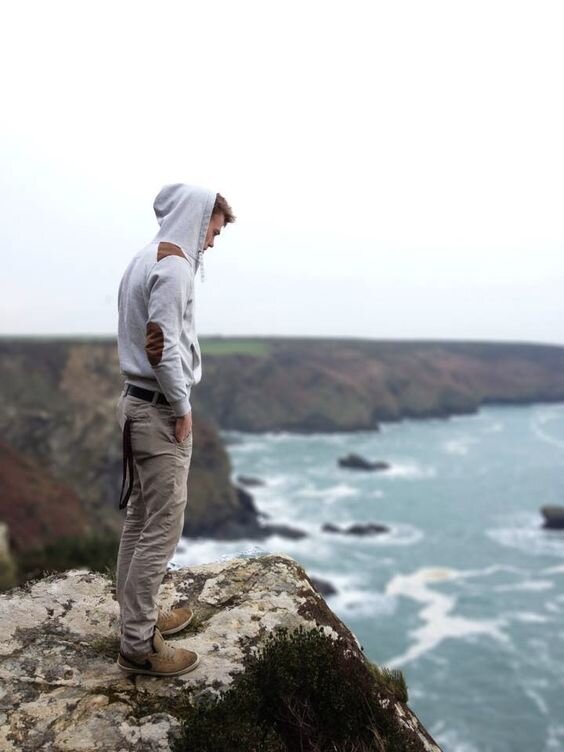You Threw Them Away! Remember?

You Threw Them Away! Remember?
A Short Story ~ Prose Version ~ Second Edition
The first edition published in hardback in 2011 was in its original stanza format
Chapter One
HE SAT there at the water’s edge, advancing tide flooding every nook and crevice, soothing the smoothness of his feet then the rush back out from between his toes, the delirious feeling of anti-gravitational pull; the retreating roar and swish before the next sweeping advance like a military pincer movement around him.
He wondered as he sat with his head on his knees in the only embrace he knew… his own.
What must it be like to have a family, to be a part of the whole, a reflection of what a long distant Carpenter’s Son had in mind, one-half dovetailing with joinery perfection?
He wondered at the sound of laughter, what it must be like to beget; to see oneself reproduced; to hear the changing tones in voices across the years, to capture long-lost memories in the voices of yesteryear once more in the laughter, the tissue and fibre of the new soul, his genes, his semen; generations long lost with only sepia photographs remaining but seemingly brought back to life.
He wondered as he looked about him, at himself, that it would have been possible to beget himself. In theory, yes. In practice though...?
No!
But just supposing he had. What would he have spawned? He wondered. He lost himself in a sea of thought and empty depressive emotions. What must it be like to go home to a family each night, to have two lifestyles, two roles, professional – at work, private – at home? What must it be like not to work all the hours that G-D gave us?
What must it be like, he wondered, to be rather more than some distant far-off uncle or cousin; instead, a father, a grandfather, even?
Of course, he’d never know, but – just occasionally he would catch a glimpse of former years mirrored in present times, long-distance phone calls from Brussels, Madrid, and Qatar; the occasional text from Buenos Aires, Larnaca, and Moscow; an email from New Zealand.
He wondered about all the young people who treated him as a father, one even declaring 'I wish you had been my dad’ and swift rebuke in reply; yet inside him his soul longed beyond measure to be the father of this ‘son’ he adored, and still does, and always will, but kept within the confines of his heart.
If only we could, he wondered. If only he too could see those fingerprints on the door* and hear the creak of the stairs again, the squeak of the bed frame on the other side of the wall; at the glimpse of first light; the drop kick over his head in a little cottage terrace in Wycombe Lane on Wooburn Green.
He wondered if the Horse Chestnuts still stood, that tall one always pronouncing the arrival of summer, driving to Beaconsfield through leafy lanes and up the winding three-lane hill, the long-lost purr of a gun metal grey Mercedes E320 with the stars and stripes in honour of 9/11, puzzling many, angering many more; but none, except a narrow-minded executive, ordering it to be removed ‘now’ in Allah’s Name! Don't you realise I could have you blown up? I've been training in Syria!’ … … himself bemused at the Biblical reply and seventy vestal virgins flung back in his face, a heap of burkhas at his unpolished feet. The whimsical smile as he edged through the tourists in Dover.‘It’s a diplomatic car, look at the flag on the windscreen and the plate.’ A7 YAH causing tongues to wag, inquisitive nosy parkers to ponder and make two and two equal five; a silly fundamentalist Christian losing the plot, bending down to kiss the plate! These things amused him!!
The tide encroached, surrounded, receded and this time caressed his waist. He wondered again of family life. Was it too late now in the twilight years? What life was this? To live and work and work to live? To watch others go to distant shores, long dreamed of cruises; to share the burdens of everyday monotony, turning the dreariness into the thrill of sharing it all. He wondered whether of all the people he had known in years past there were any who had indeed felt likewise and but for fate’s cruel hand would have seen them come together, united, one, sixty-nine! He wondered again what it must be like to form a relationship. How on earth had this so adeptly evaded him? What others took for granted permanently escaped him, left him paralysed, like a lasered drawing of an angel in ice. It cut deep into his soul, the water above his waist now. . . sapping his spirit. How was it, he wondered, that he had allowed a life to lose control? He wondered as the waves now took on a menacingly inviting and comfortable feeling, no longer rushing, his body moving with the swell, though anchored still. Up to his armpits now.
Salt!
That precursor of death; that ignominious sting, symbol of sin to some and most surely to
the Host of Heaven; piercing his chafed lips and eating his skin. His mind traversed a sudden outcrop in an instant … all that baloney! How on earth did I fall for all that? What he had had been great. “All is emptiness…” some poet penned, he cannot remember who, or was it a scripture?
He didn’t know anymore. But he knew he was ready now to let go. And so he did. He wondered as he drifted whether anyone would miss him. Sadly no.
He had been of use to many in his heyday. That was all.
Chapter Two
A stunning male FIGURE stands on the foreshore watching, arms folded gently across his chest, his hands are delicate and fresh but strong. He has a quiet pleasant look. Deep contemplation. A light upon him seems brighter than the rays of the sun that makes the beach seem golden. He watches intently. Godlike but not angelic. Gentle. Alluring. Comforting, spiritual.
In the distance, he caught a windmill or two way out on the horizon. Where had he come from? Where had this sunlight come from? Sitting there soaked and almost shirtless, even his shoes had floated off. But this man dressed in a shirt, jacket and jeans, in the prime of life… And just peering into his soul… not threatening… but neither was he of this world, that he knew for sure, even though how he knew, escaped him. The man spoke very gently, with a local accent too.
Chapter Three
IT IS NOT your time yet. You canna force yourself into His Presence you know.
All is not “emptiness” at all in your case, lad. There’s work to be done. I’m going to go very shortly but remember this conversation and know that you are never alone. We are just here. Come. Give me your hand.
And suddenly, he was pulled to his feet.
Your keys!
My keys?
Yes, your car keys. You threw them away. Remember?
He remembered.
Drive home. And start afresh. A new beginning. You’ll not see me again. But rest assured I’m always here, And you’ll know those many times in the years to come when things will happen, and you’ll just know, lad. Get on with your work lad. Help others!
He looked down and back towards the car and when he looked up again the Figure had turned his back , silhouetted against the radiance of the sun. And there, all about him there was a rippling shadow . . . a great arc. There, but not there. It was a stunning moment, so much so, it was as if a vacuum sucked out the very air in his lungs and he could taste again that unique taste from being in the womb.
Seen only by him.
Understood only by him.
Chapter Four
HE SLOWLY WALKED back to the car. As he did so, a seagull swooped around, landing a few feet from him, its wings outstretched, shadowing the sand, a fraction of what had earlier been about him, around him. , covering him.
In dark and difficult moments when all seems to be ready to swamp you, do not give in. Address the Universe in the way that most appeals. Rest assured. We will be heard!
Epilogue
All of us, without exception, experience the low points in life as well as the high points. The high points in life we experience enable us to handle the low points. Low points come in all guises. I threw all religion per se overboard a very long time ago. Yet curiously, my faith remains intact.
When I read history, I am reading a person’s subjective view of an historical account. The subjective view becomes more reliant the more I examine the evidence that led the historian to deduce their hypothesis. We have to go back into whatever period we examine and examine the contemporary evidence. We will not always like what that evidence produces, because the evidence gives us a quite different account of what has often become the attractive folklore of that period.
In the 1990s, I began taking the Josephian approach in reading biblical accounts i.e., reading in between the lines and refusing to accept the bland, direct, literal statements.
Just what did happen on the road to Emmaus? How did those two people feel when the stranger walking the same route came up beside them, listening to their reports of what had just happened at Golgotha (the Place of the Skull)? Why all the commotion? Attempts to grasp the meanings of religious texts and getting into a muddle only increased their exasperation. One of them, a chap named Cleopas relied to the stranger’s enquiry with a hint of sarcasm.
“Are you the only one visiting Jerusalem who does not know the things that have happened there in these days?”
Why did the latecomer then expound to them the meaning with such clarity, we are told? And then their reaction when the stranger then suddenly left the party?
I do not know the answer. But I am able to draw upon contemporary evidence. In short, I can easily see that over three days, Jerusalem, the seat of government for the Roman Prefecture, the occupying power, had descended into mayhem despite its very strong Roman garrison.
When I read in between the lines, it means I am using the tool of discernment.
In 2023 this is even more important a skill for every one of us to develop.
Using artificial intelligence, I can produce convincing images of ‘real people’, except that they are not real. Their skeletal form is a mixture of my text and algorithmic interpretation of that text. The gallery that accompanies this short story is an example.
This story is partly true. We find ourselves on a beach not far from the Port of Liverpool. It was not a good day. It was a low point. Now this is where I have to be careful. This is where I have to separate fact from fiction.
Writers draw upon their life’s experiences. Things slip into their manuscripts that make for good reading. It is why they are good writers. Dame Agatha Christie is a perfect example, where the writer interweaves into her storylines events and occurrences that she personally experienced. Fact and Faction.
If I donned my court robe,
I might have been heard to say to the person I’m questioning,
May I put it to you sir/madam that your literal interpretation of the Book of Leviticus as fact, is actually a literal interpretation of facts sprinkled with a great deal of fictional exegesis gathered over many, many centuries and then passed down to each succeeding generation as absolutely categoric?
And that with each passing, things might be added or deleted, not necessarily deliberately but because, with each century, we find a different point of view?
Or, that we need to give the book a different meaning in order to correlate to the prevailing political and religious climate?
In 2023 the alarm bells are strident. Deep Fake.
Not so long ago, we would discern fake from fact with ease. As we enter 2024, we have the technology to produce perfect copies of a person’s voice and the ability to perfectly attune that person’s lips and recognisable body movements to the fake text we have written.
We need to be on our guard.
“But unto you that revere my Name shall the Sun of righteousness arise with healing in his wings ... ”
21 November 2023
All Rights Reserved
LIVERPOOL
© 2023 Kenneth Thomas Webb
Digital Artwork by KTW
Written 2010-2011
Blackpool and Liverpool
First Published in Meanderings in October 2011 by Spiderwize (hardback)
* From the ballad "Break" by Steve Edwards of New Zealand
Gallery ~ You Threw Away! Remember?
Ken Webb is a writer and proofreader. His website, kennwebb.com, showcases his work as a writer, blogger and podcaster, resting on his successive careers as a police officer, progressing to a junior lawyer in succession and trusts as a Fellow of the Institute of Legal Executives, a retired officer with the Royal Air Force Volunteer Reserve, and latterly, for three years, the owner and editor of two lifestyle magazines in Liverpool.
He also just handed over a successful two year chairmanship in Gloucestershire with Cheltenham Regency Probus.
Pandemic aside, he spends his time equally between his city, Liverpool, and the county of his birth, Gloucestershire.
In this fast-paced present age, proof-reading is essential. And this skill also occasionally leads to copy-editing writers’ manuscripts for submission to publishers and also student and post graduate dissertations.




































